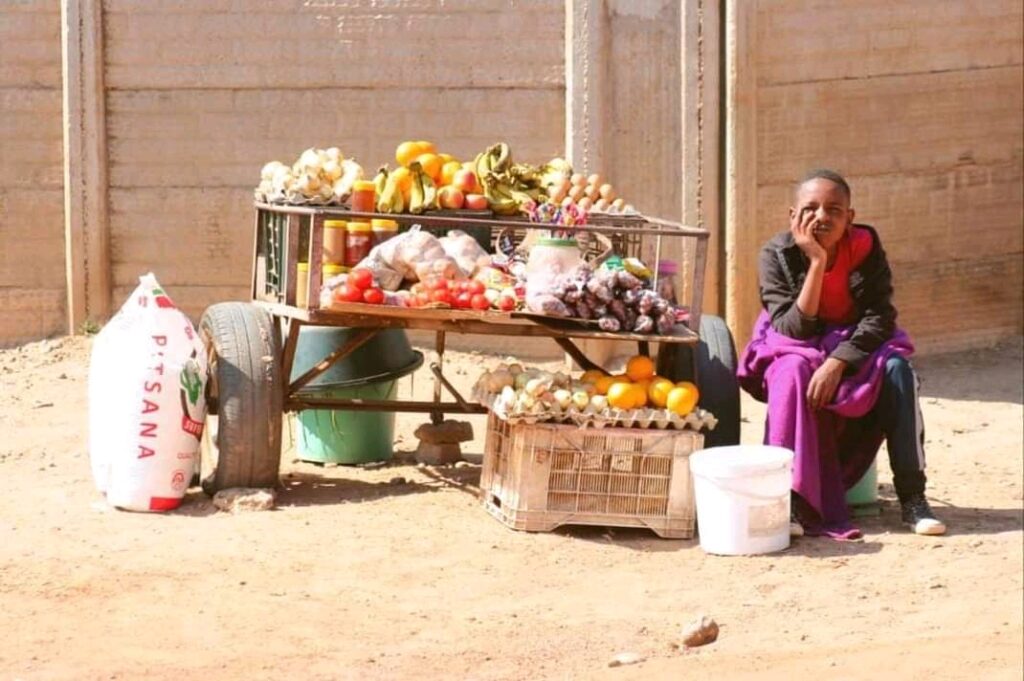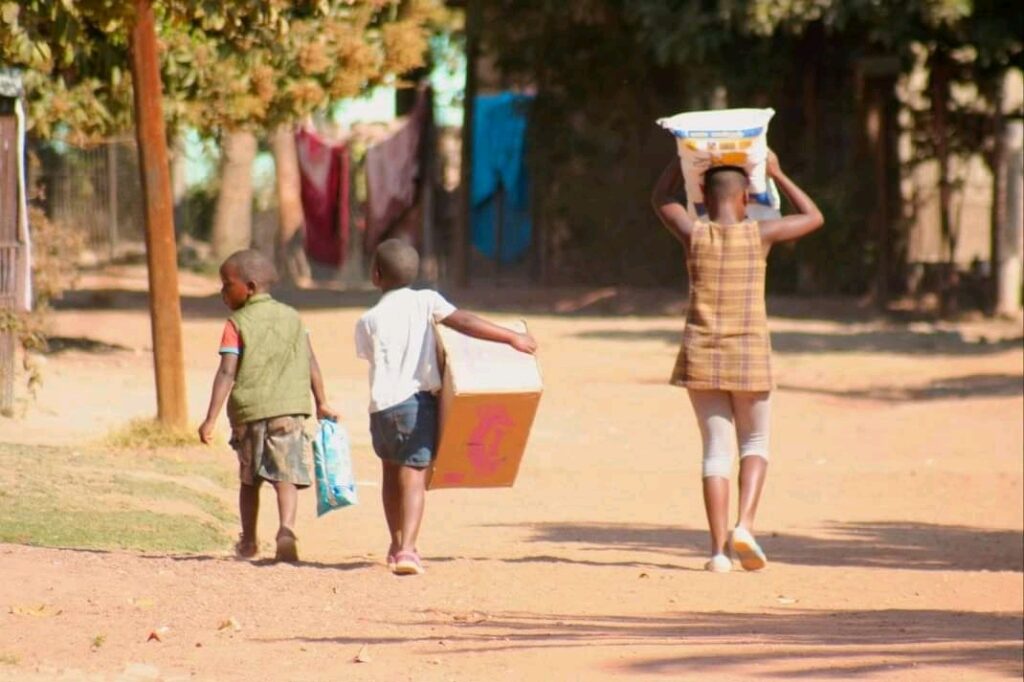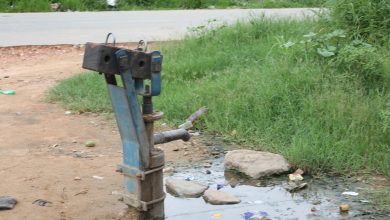Gweru- The COVID -19 induced lockdowns have caused a lot of untold suffering. Gweru City Council’s 2021 strategic plan report revealed that most households in the Midlands Province were surviving from hand to mouth.
According to the Zimbabwe National Statistics Agency findings, 90% of the working population is currently surviving on informal trading, a development that has made it difficult for most Zimbabweans to save their earnings as the harsh economic challenges continue to stifle the livelihoods of the ordinary citizens.
Jacqueline Sithiya, a widow residing in Montrose Plots in Gweru, walked a 10 km distance to do weeding work at a Horticulture farm where she is paid $2USD per day.
With the rising inflation, Sithiya has also found herself amongst individuals who have failed to raise school fees for her children’s education due to economic hardships.
“I had to leave my children unattended for days whilst at the farm to raise money for basic food items. The wage I earned was too low to feed my family and cater for rentals as well.
“We are seven (7) families living in this compound and each household uses one room and we share a toilet. At one point, during the previous lockdown, I survived on vending but my goods were confiscated by the Police and never recovered.
“I cannot afford to raise school fees for my children hence gave my elder sister one of my daughters to look after her as a way of cutting expenses. I am worried about her welfare though. Two of my children have already dropped out of secondary school due to financial problems.
“When the Government’s COVID-19 Relief Fund came I did not get anything. Rather, I managed to get food aid from donors such as CARE who brought rice, cooking oil and beans. I am very grateful for the gesture,” added Sithiya.
Another resident, Gogo Sasenkosi Sibanda said she relied on barter trading her hand-sewn doormats for cups of basic foodstuffs.
Narrating her ordeal, Sibanda said she found it difficult to visit people due to CODI-19 induced travel restrictions.
“My usual door-to-door selling was very difficult due to travel restrictions. However, I would ask for some food items from my neighbours in exchange for mats,” said Sibanda.
Currently, Sibanda lives in a single room with her seven (7) grandchildren. However, she was optimistic that one day her children would get decent jobs and improve their living conditions.
“My wish is to have a place of my own, currently I am failing to raise $15USD for my monthly rentals. Life is generally a struggle for me and my family but we have accepted it. We once slept without food.” she said.
However, Sibanda survived on vending prior to the lockdown but used all her capital when there was no food in the home.
In a related incident, a family of 7 in Tinshel Gweru is currently living squashed in a shack.

The development has gone for close to 5 years now as Mr James Zimi is failing to raise money to build his house due to financial constraints.
“Am surviving by God’s grace, I don’t have the financial capacity to build a home for my children due to unemployment, said Zimi.
An Economist, Trust Chikohora said that the coming in of the pandemic further strained the already declining economy.
“As a nation, we were already battling an economic crisis as it was already inflated. Due to this background, one can see that according to current statistics the informal sector contributes about 60% of the gross domestic product and 80% of employment in the country.
“The coming in of COVID-19 worsened the situation as it then cut off the jobs of informal traders, who largely survive on hand to mouth. Livelihoods of most youths and women were disrupted and these people had to then survive on handouts from relatives, donors, the government and the diaspora. Most of the affected groups are still failing to survive as their businesses went down.
“In view of the pandemic it is then wise for the government to try to contain the pandemic through the vaccination program so that at least herd immunity is reached and we can then strive to go back to normalcy.” he added.
According to the Zimbabwe National Statistics Agency (2015) report, 94,5% of the 6,3 million people defined as employed are working in the informal sector.
The development has seen the Total Consumption Poverty Line (TCPL) for one person rising to $8,009 for December 2021.
Earning US$2, most of the individuals like Sithiya found it difficult to surpass the poverty datum line as they cannot afford three decent meals per day.
Meanwhile, Women Coalition of Zimbabwe (WCoZ) Midlands Coordinator, Gracia Mashingaidze urged the Civil Society Organisations to establish sustainable projects for vulnerable groups.
“Civil society should assist women and youths to start up sustainable income-generating projects as individuals or groups.
“The government must invest more in social protection, economic empowerment and job creation in order to alleviate poverty and hunger from women and youths.
More so, there is need for close monitoring and evaluation of all poverty alleviation or social protection programs so that they reach intended beneficiaries.” Mashingaidze added.

Another women advocacy organization, Women of Africa (WoA) urged the government to provide capital for women start-up projects to resuscitate businesses that were affected by the COVID-19 pandemic lockdowns.
“Banks such as the Zimbabwe Women’s Bank and the Empowerment Bank should provide starts-up to women and also advocate for women empowerment and link them to vocational centres for them to get skills needed for survival.
“Women should be capacitated with resilient and disaster management courses which can also be linked even to practical projects such as horticulture, market gardening, welding so that they will not solely depend on one way of earning money” added Clifford Chikukutu, WoA Director.
Gweru Residents and Ratepayers Association (GRRA) director, Conelius Selipiwe said there was need to recognise how people were surviving in the informal sector before making critical decisions like the national lockdown.
“There is need for us to first acknowledge that as a country our economy is now informal as most households are surviving on vending, as highlighted by the Gweru City Council’s strategic plan.
“We discovered that more women are working as compared to men as informal traders, and this was caused by the economic meltdown and further worsened by the lockdown.
“So in the near future, we propose that if our Government is to impose a lockdown, there is need for proper planning so that we avoid pushing the communities into absolute poverty as more people are surviving on hand to mouth.
“In an ideal setup, we advise that the Government should have a disaster management plan which helps cover disasters. It is prudent for our government and local authorities to always have ready funds to avert disasters,” said Selipiwe. However, there is a need to capacitate women and youths with income-generating projects and start-ups that can sustain them during disastrous


